What do you all think about Judith Butler's performative theory of gender? I claim her works lays the foundation for the new identity politics of genderqueer and non-binary people. The whole "+" part of "LGBTQ+" comes from Butler's interpretation of Foucault's notion of the proliferation of sexualities, in my opinion. A new "Gender Ideology" (scare quotes) gets a lot of criticism these days, but Butler was there with a theory of gender and ideology decades ago.
You are using an out of date browser. It may not display this or other websites correctly.
You should upgrade or use an alternative browser.
You should upgrade or use an alternative browser.
Judith Butler and the new identity politics?
- Thread starter ?!..!?
- Start date
I don't know how many people here will have read Judith Butler - isn't she famously impenetrable? I'm familiar with the broad outlines but I completely agree she's laid the theoretical foundations for a lot of modern queer id politics. I'd be interested in hearing what ways her work might not be true, might be critiqued. Heard some foreign policy stuff from her that seemed decidedly dodgy but I can't recall details.
version
Well-known member
Heard some foreign policy stuff from her that seemed decidedly dodgy but I can't recall details.
How often are people reading Butler for foreign policy? It's a mark against someone, but I also think it's just one of the pitfalls of being a 'public intellectual' that they inevitably end up wandering out of their area of expertise and sharing opinions on things they don't know as much about.
Murphy
cat malogen
Bourdieu’s habitus is another route in, true, but he didn’t have cat memes @malelesbian
From an ex-colleague’s dissertation, because with a name like ‘male lesbian‘ posted at 5:16am GMT I assume this a heartfelt and serious question
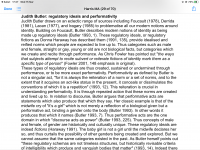
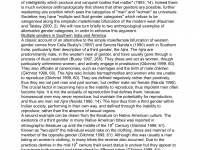
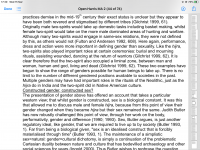
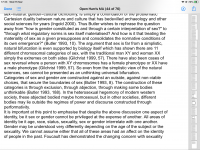
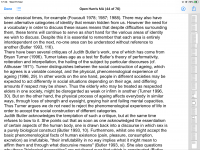
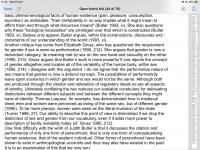
From an ex-colleague’s dissertation, because with a name like ‘male lesbian‘ posted at 5:16am GMT I assume this a heartfelt and serious question






sus
Moderator
Butler's take on the performativity of gender is absolutely true. It's also completely at odds with the modern gender and political landscape, performative hat-tips to post-structuralism aside. What I think has been discovered is that the de-reification of social reality runs counter to most intuitive orientations to the world, and so the political takeaways of de-reifiers have been themselves reified as new "natural" fact.
sus
Moderator
For instance, you can't pledge allegiance to post-structuralism/deconstructionism/Judith Butler while also taking a strip out of progressive social reality and arguing it's "Just Correct": that a woman's right to choose "just is" some intrinsic right to bodily autonomy, or that it's a "fact" that a fetus isn't a baby, or that the science of transgenderism (or even climate change) is "clear" and we need to "believe the science" and "believe journalists." Post-structuralists were radical, and that radicality must be kept alive. You can't invoke cultural relativism as this panacea against anti-Islam sentiment while turning around and saying Wisconsinites need to be subject to the exact same moral regime as Manhattanites. These stances are incoherent, and IMO it's far better to de-reify/de-naturalize your own socially inherited views, on the path to pluralistic enlightenment, than it is to occasionally (when convenient) use these concepts as a battering ram against your political foes.
sus
Moderator
Like Wash pointed out Bourdieu's habitus accomplishes a lot of this; so does Ludwig Fleck's work on thought collectives. A ton of things we take as facts are really habits of thought, or Schelling points, or moods, or orientations, and we constantly erase the latent values baked into our way of seeing.
Murphy
cat malogen
@WashYourHands The excerpt you posted outlines some major issues in Butler, such as regulativity, materialization and abjection. What field did your colleague study in?
I think a lot of people reject Butler's claim that bodies materialize discourse. It seems to trap us in language, to ensnare us in words to ensure we can never talk about the body-in-itself. But I don't know what claims about the body as such would be relevant to Butler's arguments.
Is social constructionism opposed to realism or is it a kind of realism about social constructs? Butler affirms cognitive claims about the structure of reality; gender really is behavior in discursive context. Gender's appearance is its reality; the expressive presentations our bodily appearances manifest constitute our real gender identities.
I think a lot of people reject Butler's claim that bodies materialize discourse. It seems to trap us in language, to ensnare us in words to ensure we can never talk about the body-in-itself. But I don't know what claims about the body as such would be relevant to Butler's arguments.
Is social constructionism opposed to realism or is it a kind of realism about social constructs? Butler affirms cognitive claims about the structure of reality; gender really is behavior in discursive context. Gender's appearance is its reality; the expressive presentations our bodily appearances manifest constitute our real gender identities.
Clinamenic
Binary & Tweed
@luka has propounded some serious theory to this effect, his thesis being that "thinking doesn't exist" and that the conceptual sphere of our existence is some superfluous appendage to the more carnal experiences like, say, chasing shoals of herring with one's fellow shipmates.@WashYourHands The excerpt you posted outlines some major issues in Butler, such as regulativity, materialization and abjection. What field did your colleague study in?
I think a lot of people reject Butler's claim that bodies materialize discourse. It seems to trap us in language, to ensnare us in words to ensure we can never talk about the body-in-itself. But I don't know what claims about the body as such would be relevant to Butler's arguments.
Clinamenic
Binary & Tweed
Incidentally Judith Butler is notorious for her essay "Deconstructing the Herring: Marine Performativity"
Clinamenic
Binary & Tweed
"The performativity of marine creatures, specifically herrings, is a complex phenomenon that demands close analysis. At its core, the performativity of herrings is deeply entwined with their social and ecological context. To deconstruct the performativity of herrings, we must consider the ways in which their behavior is shaped by social norms and expectations, as well as the broader ecological systems that govern their existence."
Mr. Tea
Let's Talk About Ceps
^cod philosophy"The performativity of marine creatures, specifically herrings, is a complex phenomenon that demands close analysis. At its core, the performativity of herrings is deeply entwined with their social and ecological context. To deconstruct the performativity of herrings, we must consider the ways in which their behavior is shaped by social norms and expectations, as well as the broader ecological systems that govern their existence."
Derrida claimed "The thought does not exist". I understand that to mean that propositions lack meaning when separated from their content. Merleau-Ponty's concept of the lived body is all over Butler's work. For Butler, our body's movements and appearances express our subjectivity. Combine the lived body with Foucault's concept of biopolitics and you get Butler's theory of ideology as power's influence on subject-formation. Society exercises power over out bodies and in turn, our personalities.@luka has propounded some serious theory to this effect, his thesis being that "thinking doesn't exist" and that the conceptual sphere of our existence is some superfluous appendage to the more carnal experiences like, say, chasing shoals of herring with one's fellow shipmates.
william_kent
Well-known member
i'm conflicted about Judith
this interview from 2010
when I was 14 my main concerns were "when will this zit go away?" and "does X fancy me?" I certainly didn't know who Spinoza was or whatever else the teenage Judith was retrospectively fascinated by... this interview answer strikes me as a bit disingenuous, but then maybe she was precocious and I was, and remain, really thick... when the teacher told the 14 year old me that I was "too talkative in class" my response was to avoid eye contact and a "fuck you" muttered under my breath - "What did you say?!"..."erm, nothing..."
but, I have partially read copies of Gender Trouble and Bodies That Matter, and as a John Waters fan I have to respect her play on words, although when I suffer from insomnia these are go to works for sending me to sleep, my eyes can barely focus after a paragraph
she is the the spectre*** hanging over humanities - I have friends who write papers on queer studies and the like, and they moan to me that they are obliged to quote Judith, even though they take issue over some point that I'm too stupid to understand, and then on the other hand I have friends who were inspired by the Judith who made them realise that it was OK to be themselves
but from my reading of Judith, it strikes me that Butler states the obvious, only that it is couched in ultra-academic theory that makes it sound far more intellectual than it really is...
although when I see a snippet of an Andrew Tate video I truly understand that gender is performative, he is totally acting out his idea of what a "male" is, and Judith is 100% correct ( admittedly this is probably not the example she intended to provide proof of her correctness )
*** I sometimes wonder if "Judy" from Twin Peaks is one and the same
this interview from 2010
I'm sure I've told you that I began to be interested in philosophy when I was 14, and I was in trouble in the synagogue. The rabbi said, "You are too talkative in class. You talk back, you are not well behaved. You have to come and have a tutorial with me." I said "OK, great!" I was thrilled.
He said: "What do you want to study in the tutorial? This is your punishment. Now you have to study something seriously." I think he thought of me as unserious. I explained that I wanted to read existential theology focusing on Martin Buber. (I've never left Martin Buber.) I wanted look at the question of whether German idealism could be linked with National Socialism. Was the tradition of Kant and Hegel responsible in some way for the origins of National Socialism? My third question was why Spinoza was excommunicated from the synagogue.
when I was 14 my main concerns were "when will this zit go away?" and "does X fancy me?" I certainly didn't know who Spinoza was or whatever else the teenage Judith was retrospectively fascinated by... this interview answer strikes me as a bit disingenuous, but then maybe she was precocious and I was, and remain, really thick... when the teacher told the 14 year old me that I was "too talkative in class" my response was to avoid eye contact and a "fuck you" muttered under my breath - "What did you say?!"..."erm, nothing..."
but, I have partially read copies of Gender Trouble and Bodies That Matter, and as a John Waters fan I have to respect her play on words, although when I suffer from insomnia these are go to works for sending me to sleep, my eyes can barely focus after a paragraph
she is the the spectre*** hanging over humanities - I have friends who write papers on queer studies and the like, and they moan to me that they are obliged to quote Judith, even though they take issue over some point that I'm too stupid to understand, and then on the other hand I have friends who were inspired by the Judith who made them realise that it was OK to be themselves
but from my reading of Judith, it strikes me that Butler states the obvious, only that it is couched in ultra-academic theory that makes it sound far more intellectual than it really is...
although when I see a snippet of an Andrew Tate video I truly understand that gender is performative, he is totally acting out his idea of what a "male" is, and Judith is 100% correct ( admittedly this is probably not the example she intended to provide proof of her correctness )
*** I sometimes wonder if "Judy" from Twin Peaks is one and the same
Benny Bunter
Well-known member
She won the the world's worst writing award once for this sentence:
First prize
"The move from a structuralist account in which capital is understood to structure social relations in relatively homologous ways to a view of hegemony in which power relations are subject to repetition, convergence, and rearticulation brought the question of temporality into the thinking of structure, and marked a shift from a form of Althusserian theory that takes structural totalities as theoretical objects to one in which the insights into the contingent possibility of structure inaugurate a renewed conception of hegemony as bound up with the contingent sites and strategies of the rearticulation of power."
First prize
"The move from a structuralist account in which capital is understood to structure social relations in relatively homologous ways to a view of hegemony in which power relations are subject to repetition, convergence, and rearticulation brought the question of temporality into the thinking of structure, and marked a shift from a form of Althusserian theory that takes structural totalities as theoretical objects to one in which the insights into the contingent possibility of structure inaugurate a renewed conception of hegemony as bound up with the contingent sites and strategies of the rearticulation of power."
Benny Bunter
Well-known member
Perhaps @malelesbian can 'unpack' that for us? 🤣

